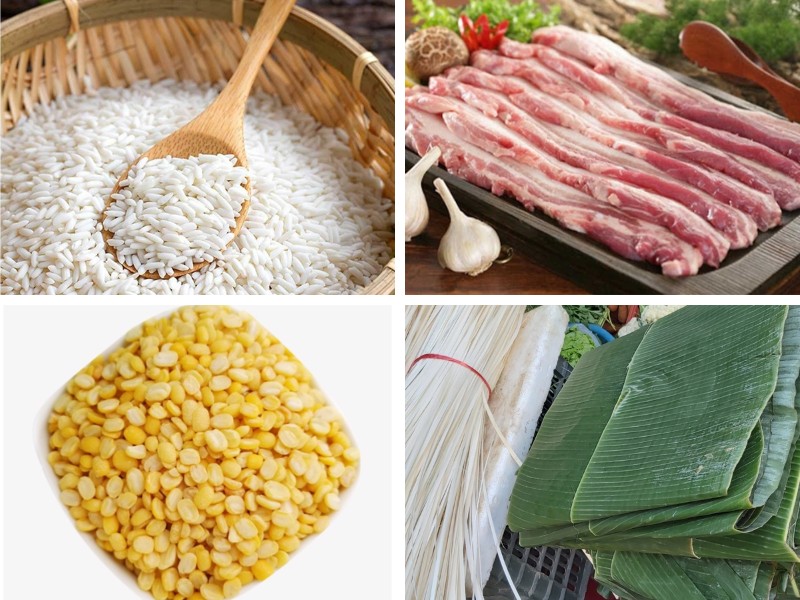As Tet, the Vietnamese Lunar New Year, approaches, the air is filled with excitement, joy, and the aromatic scent of traditional delicacies. One such common Vietnamese food that takes center stage during Tet is Banh Tet, a beloved Vietnamese rice cake that symbolizes prosperity, luck, and familial unity. In this blog post, Viet Cruise Tours 'll explore the rich history, cultural significance, and mouthwatering flavors of Banh Tet.

Banh Tet has a deep-rooted history dating back centuries, originating from the southern region of Vietnam. Historically, it was crafted as an offering to ancestors during Tet celebrations, symbolizing a connection between the living and the departed. Over time, Banh Tet evolved into a cherished and common Vietnamese food enjoyed by families and friends as they come together to welcome the Lunar New Year.
In the face of modernization and changing lifestyles, Banh Tet serves as a bridge between the past and the present. Families continue to pass down the art of Banh Tet preparation from one generation to the next, ensuring that the tradition remains vibrant and alive. This commitment to preserving cultural practices contributes to the enduring legacy of Banh Tet in Vietnamese society.

The layers within Banh Tet symbolize the connection between heaven and earth. This intricate structure is a metaphor for the continuity of life, bridging the past, present, and future. Each layer contributes to the overall unity and balance of the dish.
Banh Tet's prominence during Tet celebrations extends beyond its delicious taste. It serves as a cultural glue, bringing families together. The act of collectively preparing and sharing Banh Tet fosters a sense of unity, reinforcing familial bonds.
Presenting Banh Tet as an offering on the family altar is a poignant tradition. This act of respect towards ancestors signifies gratitude for their guidance and a desire to maintain a strong cultural connection with the past.
While Banh Tet is a symbol deeply embedded in Vietnamese culture, regional variations showcase the diversity within the country. Despite these differences, the shared essence of celebrating Tet and familial togetherness remains a unifying thread.

The heart and soul of Banh Tet lies in its simple yet carefully selected ingredients. The two main components are glutinous rice and mung beans, which are layered together to create a harmonious blend of textures and flavors. The filling may also include pork, creating a savory contrast to the sweet mung bean layer. The entire creation is wrapped in banana leaves, giving Banh Tet its distinctive cylindrical shape.
The preparation of Banh Tet - a common Vietnamese food is a labor of love that requires meticulous attention to detail. Families often gather in the days leading up to Tet, sharing stories and laughter as they collectively prepare these culinary masterpieces. The process involves layering the ingredients, carefully wrapping them in banana leaves, and then boiling or steaming the cakes until they achieve the perfect consistency.

Glutinous Rice: Soaked and drained.
Mung Beans: Cooked and mashed.
Pork: Seasoned and sliced (optional).
Banana Leaves: Cleaned and heated for flexibility.

Layering:
Begin by placing a thin layer of banana leaves at the bottom to prevent sticking.
Add a layer of soaked glutinous rice as the base.
Mung Bean Filling:
Spread a layer of sweetened mashed mung beans on top of the rice, creating a distinct sweet layer.
Pork Layer:
Optionally, add a layer of seasoned and sliced pork in the middle for a savory touch.
Top Layer:
Complete the assembly with another layer of glutinous rice.
Wrapping:
Fold the banana leaves tightly around the layers, forming a cylindrical shape. Secure with kitchen twine.

Boiling or Steaming:
Banh Tet can be boiled or steamed, depending on regional preferences.
Boil for several hours or steam until the rice is cooked thoroughly and has a sticky consistency.

Cooling and Slicing:
Allow Banh Tet to cool before slicing, ensuring well-defined layers.
Enjoying:
Banh Tet can be enjoyed on its own or accompanied by pickled vegetables, fish sauce, or other condiments.

Eating Banh Tet is a delightful experience that involves savoring its unique layers and flavors. Here's a guide on how to enjoy common Vietnamese food in a proper way:
Use a sharp knife to slice Banh Tet into even, bite-sized portions. Cutting it carefully ensures that the distinct layers remain intact.
Banh Tet can be enjoyed on its own or with various condiments and dips. Fish sauce, soy sauce, or even a spicy chili dipping sauce can enhance the overall taste.
Complement the savory notes of Banh Tet with pickled vegetables or a side of fresh herbs. This adds a refreshing element to each bite.
Banh Tet can be served warm or at room temperature. Some prefer it freshly steamed, while others enjoy it after it has cooled. Experiment to find your preferred temperature.
Accompany your Banh Tet with a cup of hot tea or traditional Vietnamese coffee. The contrast between the rich, sweet cake and a warm beverage is a delightful combination.
Before diving into your Banh Tet, consider following cultural traditions. Present the cake as an offering on the family altar, expressing respect for ancestors and family heritage.
Banh Tet's layers offer a harmonious blend of textures and flavors. Take a moment to appreciate the combination of sweet mung beans, savory pork (if included), and sticky rice in each bite.
*Address:
- 2 Paris Commune, Ben Nghe, District 1
- 241 Pham Ngu Lao St, Pham Ngu Lao Ward, District 1
*Website: https://vietcruisetours.com/
*Hotline/Whatsapp: +84 908.785.680
*Email: contact@vietcruisetours.com
Newer articles
Older articles